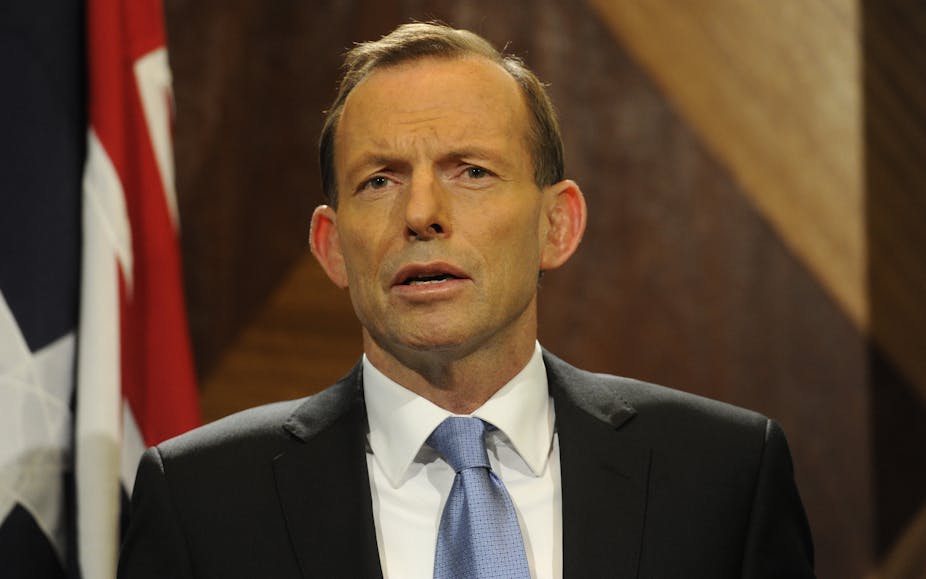Opposition Leader Tony Abbott’s recent overseas trip to help burnish his international credentials has revealed more of the potential direction of the Coalition’s foreign policy. Following his visit to the United States (as part of the regular Australian American Leadership Dialogue) was a visit to China, where he gave a speech to the China-Australia Chamber of Commerce and held meetings with Chinese Communist Party officials.
While he praised the growing economic strength of China, he also warned that government-owned Chinese investment in Australia may face greater restrictions under a future Coalition government. This has already been criticised as potentially threatening future foreign investment in Australia, with Foreign Minister Bob Carr claiming Abbott’s policy stance would result in a “retreat from Asia”.
Abbott’s 2009 book, Battlelines, didn’t reveal much depth of a foreign policy viewpoint beyond an emphasis on the “Anglosphere”, highlighting Australia’s traditional relations with the USA and UK, and also favouring Japan, as it shares similar values of a liberal democracy and market economy. Abbott has also stated his foreign policy would have more focus on Indonesia, although the Coalition’s relations with Jakarta over asylum seekers is already problematic.
Abbott appears to be adhering back to the Howard era of “pragmatic” relations with China, which emphasised trade, but sidelined controversies over human rights into a low-key bilateral dialogue forum. Abbott has at least declared that a Coalition government would forcefully advocate the promotion of human rights, although it remains to be seen how just how forcefully this would be applied to China, particularly if this results in any deterioration in trade relations.
Since China has shown is it increasingly willing to use its economic strength as a coercive diplomatic tool, any Australian government will continue to need to handle its relations with China extremely carefully.
Abbott pledged in Beijing to continue to pursue free trade agreement (FTA) negotiations with China, first undertaken by the Howard Government, and went on to claim that his second overseas trip as Prime Minister would be to Beijing, following his first promised trip to Indonesia, where he would somehow resolve the asylum seekers problem. Abbott hopes China will eventually embrace more reforms towards freedom in its political and legal system, to follow its economic modernisation. However, many analysts, not least former PM Kevin Rudd, argue China is unlikely to democratise any time soon, and so the world needs to somehow peacefully deal with an increasingly powerful China.
However, neither Abbott, nor shadow Foreign Affairs spokesperson Julie Bishop, have given much specific indication over how Australia should respond to the increasing tensions in the region. Military spending in Asia is estimated to overtake Europe’s this year, with fears of a conventional weapons arms race, particularly in naval and air power. Over 30% of this spending in the region is coming from China, which is increasingly assertive over territorial disputes in the South China Sea, where it is now establishing a garrison in the Paracel Islands, directly confronting Vietnam and the Philippines.The dispute with Japan over the Senkaku Islands is also intensifying.
The recent ASEAN Regional Forum (ARF) meeting in Cambodia ended without an official communique being issued for the first time, as China rejected a proposal by ASEAN, Japan and the US to establish a regional code of conduct to peacefully handle territorial disputes.
Despite the presence of regional multilateral organisations like the ARF, the East Asia Summit, and APEC, there is currently no effective institutional diplomatic mechanism to exclusively and directly deal with security problems and crises in the Asia–Pacific region. Abbott claimed in China that his government would attempt to ensure peaceful dispute resolution in the region, following international law. So far though, China is firmly resisting adherence to international law, particularly the United Nations Convention on the Law of the Sea (UNCLOS), regarding its maritime territorial claims.
On defence policy, Abbott has been critical of the $5.4 billion reduction in defence spending by the Gillard government in the last budget, indicating the Coalition will return military spending to 3% real growth, noting the criticism by the head of US Pacific Command of Australia’s defence cuts.
There seems little indication yet that an Abbott-led Coalition government would have any real appreciation of how Australia should productively respond to the diplomatic and security challenges being wrought by the increasing strategic competition in the Asia-Pacific region, beyond automatic support for the US military alliance.

